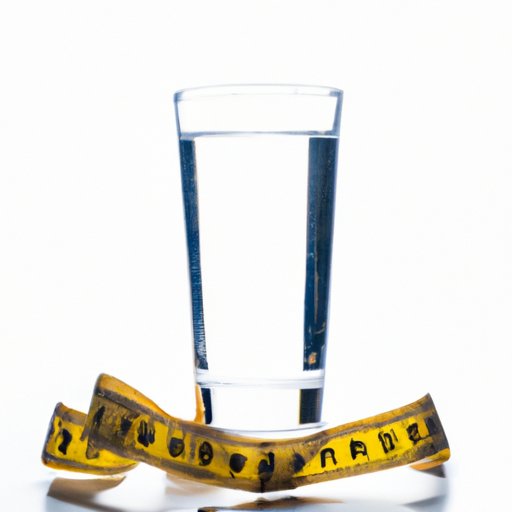
Introduction
Staying hydrated is crucial for optimal health, but determining how much water one should drink in a day can be a challenge. There are various factors to consider, including weight, activity level, and climate. In this article, we will explore how much water you should drink based on your weight and provide tips for staying hydrated.
Recommended Water Intake by Weight
The National Academies of Sciences, Engineering, and Medicine recommends that men drink about 3.7 liters (125 ounces) of water per day and women drink about 2.7 liters (91 ounces) per day. However, the amount of water one needs can vary based on their weight.
A general guideline is to drink at least half of one’s body weight (in pounds) in ounces of water per day. For example, a person who weighs 150 pounds should drink at least 75 ounces of water per day.
It’s important to note that these recommendations are for overall water intake, which includes both water and other fluids.
Table 1: Daily Water Intake Recommendations by Weight
| Weight | Recommended Water Intake |
|---|---|
| 100 lbs | 50 oz |
| 125 lbs | 62.5 oz |
| 150 lbs | 75 oz |
| 175 lbs | 87.5 oz |
| 200 lbs | 100 oz |
While these general guidelines can be helpful, everyone’s hydration needs are unique, and factors such as activity level, climate, and medical conditions can impact water intake needs.
Factors that Influence Individual Hydration Needs
There are several factors that can affect an individual’s hydration needs. Here are a few examples:
Activity Level
People who are more active may need to drink more water to replace fluids lost through sweating. According to the American Council on Exercise, individuals should drink about 17-20 ounces of water two to three hours before exercising and continue drinking water regularly during and after exercise to maintain hydration.
Climate
Hot and humid weather can cause increased sweating and fluid loss, requiring additional hydration. Individuals living in high altitudes may also need to drink more water due to increased urination and sweating.
Health Conditions
Those with certain health conditions, such as kidney disease, may need to restrict their fluid intake while others with conditions like diabetes or diarrhea may need to increase their water intake.
If you have a medical condition that affects your hydration needs, it is important to consult with your healthcare provider for guidance.
Personal Stories or Case Studies
There are many success stories of individuals who increased their water intake and experienced positive changes in their health and daily life.
For example, John, a 35-year old IT professional, used to drink only a few glasses of water a day. After learning about the recommended water intake for his weight, he started carrying a water bottle with him and tracking his water intake. Within a few weeks, he noticed an increase in energy and concentration at work and fewer headaches.
Another success story comes from Jane, a 50-year old retiree who struggled with joint pain and fatigue. After increasing her water intake, she noticed less joint pain, more energy, and improved digestion.
Comparison of Different Types of Beverages
While water is the best hydration option, other beverages can provide fluids. However, some beverages may be less hydrating than others.
Coffee and tea, for example, are often considered dehydrating due to their caffeine content. However, research has shown that moderate caffeine intake (up to 400 milligrams per day) does not appear to have a negative impact on hydration in healthy individuals.
Alcoholic beverages, on the other hand, can dehydrate the body due to their diuretic effect. It is important to drink water along with alcoholic beverages to maintain hydration.
Juices, sports drinks, and sodas can provide fluids but often contain added sugar and calories. When choosing these options, it’s important to consider the sugar and calorie content and limit intake as needed.
Tips and Tricks for Increasing Water Intake
Increasing water intake can be challenging for some individuals, but there are several strategies that can make it easier:
- Carry a water bottle with you
- Drink one glass of water before each meal
- Add fruit or herbs to water for flavor
- Use a water tracking app to monitor intake
- Set reminders throughout the day to drink water
It’s important to gradually increase water intake over time to avoid overhydration or discomfort. Consistency is key in making hydration a habit.
Conclusion
Proper hydration is essential for optimal health, and determining how much water to drink can be complex. By using the recommended guidelines for water intake based on one’s weight and considering individual factors that influence hydration needs, individuals can stay properly hydrated. Remember to choose hydration options wisely and consider making small changes to increase water intake gradually.
Now that you know how much water you should be drinking, it’s time to start tracking your intake and reaping the benefits of proper hydration.
Note: This article is for informational purposes only and should not be taken as medical advice. It is recommended to consult with a medical professional when making changes to dietary or hydration habits.





